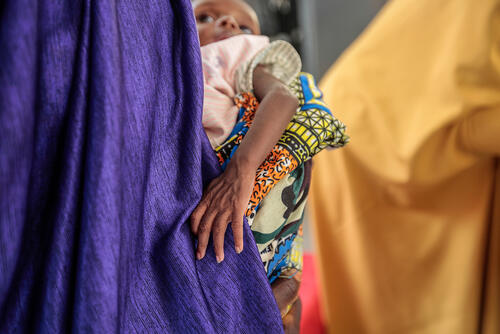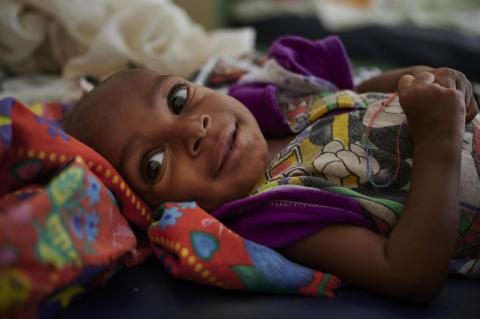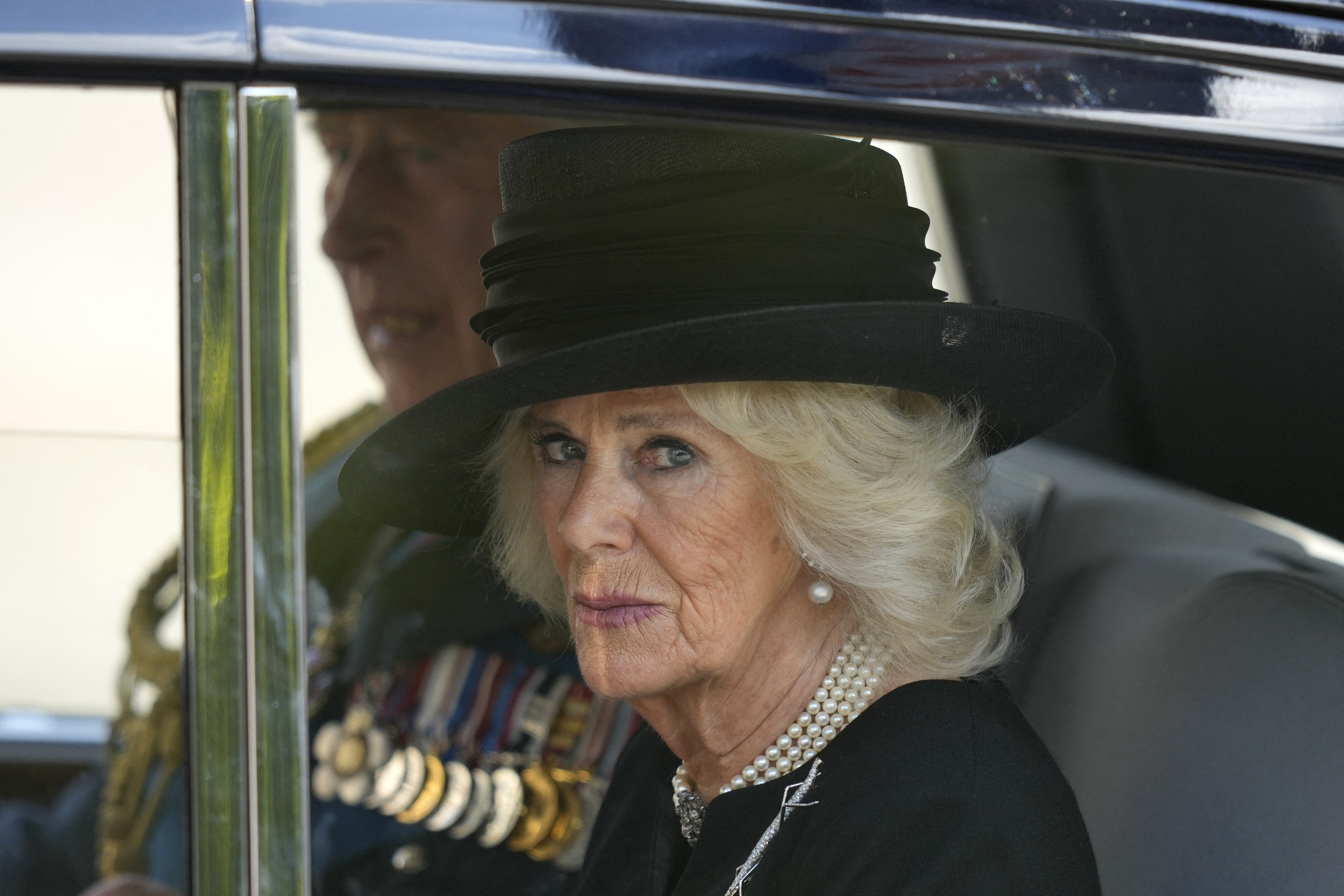
يرقد طفل فاتي عثمان على سرير في أحد المستشفيات في شمال شرق نيجيريا، ولا يبدو على وجهه أي ملمح من ملامح الحياة.
يعاني الطفل الصغير من صعوبة في التنفس ويبدو هزيلا للغاية.
وحجمه الصغير للغاية يوحي بأن عمره لا يتجاوز السنتين، لكن والدته تقول إنه في الواقع في الخامسة من عمره.
إنه مجرد واحد من عدة ملايين من الأشخاص الذين هم ضحايا أزمة إنسانية هائلة تسبب بها تمرد شنته حركة بوكو حرام الإسلامية في شمال شرق نيجيريا، مما خلف الكثير من الأسر في حاجة ماسة إلى الغذاء والرعاية الطبية.
يقول عمال الإغاثة إن النقص الحاد في المساعدات المالية هو السبب الرئيسي في جوع الناس، حيث تعتمد الحكومة النيجيرية على الدعم من وكالات الإغاثة والأمم المتحدة، التي تركز جهودها بشكل أكبر على الأزمات في أوكرانيا وأماكن أخرى
وتعد مخيمات النازحين داخليا الملاذ الأخير لملايين النيجيريين الضعفاء، ولكن على الرغم من ذلك، فقد قررت ولاية بورنو، التي تضم أكثر المخيمات تضررا، إغلاق جميع هذه المخيمات العام الماضي ووصفتها بأنها أحياء فقيرة ودفعت 200 دولار أمريكي لكل أسرة، وأجبرت تلك الأسر على المغادرة.
عندما يتعلق الأمر بالتمويل الحكومي في الشمال الشرقي بشكل عام، تأتي أزمة سوء التغذية في المرتبة الثانية بعد قتال المتمردين في المنطقة.

ويتوقع عمال الإغاثة أن ما يقدر بنحو 1.74 مليون طفل دون سن الخامسة قد يعانون من سوء التغذية الحاد في شمال شرق نيجيريا في عام 2022، بزيادة قدرها 20 في المئة عن العام السابق وقد يموت 5 آلاف طفل في الشهرين المقبلين.
تقول السيدة عثمان إن ابنها أصيب بمرض الحصبة، وتلاه الإسهال.
“حصلت على بعض الأدوية لأعطيها له، لكن حالته لم تتحسن. ما زال يعاني من الإسهال منذ 37 يوما”.
وبعد تدهور صحته، نقلته إلى المستشفى في داماتورو، المدينة الرئيسية في ولاية يوبي في شمال شرق نيجيريا.
تقول: “أحضرته إلى هنا منذ يومين”.
كان خمسة من أطفالها قد ماتوا بالفعل قبل هذه الأزمة وهو واحد من أربعة لا يزالون على قيد الحياة.
الأم البالغة من العمر 34 عاما مرهقة ومصدومة. لقد فرت من هجمات جماعة بوكو حرام الإسلامية المتشددة في بلدة ماينو الصغيرة في يوبي، وانتقلت إلى مخيم للنازحين قبل خمس سنوات.
تقول: “لم نتمكن حتى من أخذ متعلقاتنا، ولا حتى بعض الطعام”.
فشلت قوات الأمن في القضاء على تمرد جماعة بوكو حرام
وقد تفاقمت حالة سوء التغذية بسبب تفشي الأمراض، بما في ذلك الكوليرا، إضافة إلى تدهور الزراعة بسبب هجمات المسلحين.
يعمل زوج السيدة عثمان رجل دين لكنه لا يعيش مع العائلة.
وهي تحاول كسب لقمة عيشها من خلال مساعدة الجيران أحيانا على خياطة ملابسهم الممزقة مقابل الطعام. لكن الجيران هم أيضا ضحايا التمرد وقد فروا من منازلهم، ويعتمدون في معيشتهم بشكل أساسي على المساعدات من وكالات الإغاثة والحكومة.
وبطبيعة الحال ونظرا لصعوبة المعيشة والأعداد المرتفعة من الأشخاص المحتاجين للطعام، لا توجد إمدادات غذائية كافية لإعالة الأطفال ما يؤدي إلى إصابة الكثير منهم بالمرض.
وقد قال منسق المركز الدكتور جافيت أودوكو لبي بي سي: “هذه المنطقة بمثابة البؤرة، لذا فإن معظم الحالات التي تأتي هنا خطيرة”.
مثل العديد من الأطباء والعاملين في المجال الإنساني، يخشى الدكتور أودوكو وقوع كارثة، وهو يعمل على مدار الساعة، ويستقبل ما لا يقل عن 40 طفلا يعانون من سوء التغذية الحاد كل أسبوع.
وبحسب قوله، فقد قطعت بعض العائلات مسافة أكثر من 100 كيلومتر (62 ميلا) قادمة من المجتمعات النائية حيث لا تتوفر في مناطقها الرعاية الطبية. كان العديد منها تعيش في مخيمات النازحين في مايدوغوري، عاصمة ولاية بورنو، التي أغلقت أبوابها وأصبحت الآن غير قادرة على الحصول على ما يكفي من الطعام لأطفالها، لأنها لم تتمكن من الزراعة خوفا من الهجمات التي يشنها مسلحو الجماعة باستمرار.
وتعد هذه المرحلة حرجة للغاية، لأن موسم الحصاد بلغ ذروته لكنه هزيل وشحيح للغاية، وهناك ارتفاع في عدد الأطفال الذين تم إحضارهم منذ بداية العام، نتيجة لذلك، أصبحت هذه المنشأة ومثيلاتها مكتظة بالمرضى.
أخبرني الدكتور أودوكو أن فريقه قد انتهى لتوه من إعطاء العلاج لطفل تم نقله بسرعة قبل ساعات قليلة.
يقول: “الطفل فاقد للوعي نتيجة معاناته من إسهال مزمن لعدة أيام، لذلك اضطررنا إلى إنعاشه”.
وتابع قائلا: “لدينا في الواقع الكثير من الحالات الشديدة لهبوط سكر الدم والصدمة وما شابه ذلك في هذه المنشأة”.
المنشأة هي واحدة من المراكز الصحية القليلة التي تمكنت بي بي سي من الوصول إليها في بعض المواقع التي يصعب الوصول إليها في الشمال الشرقي، حيث يكافح عمال الإغاثة لإنقاذ حياة مئات الأطفال.
يخشى عمال الإغاثة أن يموت آلاف الأطفال جراء الأمراض
في مرفق صحي آخر في المركز التجاري لباما في ولاية بورنو، يسابق العاملون في مجال الرعاية الصحية أيضا الوقت لاحتواء الأعداد المتزايدة من حالات الأطفال الذين يعانون من سوء التغذية الحاد.
تحرير 100 مختطف من الأمهات والأطفال في نيجيريا
حفل زفاف “ملكي” في نيجيريا
تقول فاطمة بوكار البالغة من العمر 25 عاما إنها فقدت ثلاثة أطفال بسبب سوء التغذية وقطعت مسافة 30 كيلومترا حاملة طفليها الباقيين إلى المخيم.
إلى جانب طفلي فاطمة يوجد 22 مريضا في جناح يضم 16 سريرا في المركز الصحي في باما.
ابنتها البالغة من العمر أربع سنوات، التي ترقد على جانبها ووجنتاها متورمتان، تبكي بشكل متقطع كلما التفتت والدتها للعناية بطفلها الآخر الهزيل البالغ من العمر سنة واحدة.
وعلى السرير المقابل طفلة أخرى تبكي بينما تحاول والدتها قلبها لجعلها تنام على ظهرها، ويبدو معظم جسمها حتى الرقبة وكأنه محترق.
وذلك نتيجة بما يسميه الأطباء الوزمة من الدرجة الثالثة، وهو مرض جلدي يحدث عندما يكون هناك تورم شديد في الجسم. عندما يبدأ التورم في التراجع، تظهر تشققات في الجلد، مما يجعلها تبدو وكأنها حروق.
يقول الدكتور إبراهيم محمد، المسؤول عن المركز، إن هذا أحد آثار سوء التغذية الحاد.
ويضيف قائلا: “نشهد تدفقا هائلا للأطفال المصابين بسوء التغذية الحاد كل يوم.. ويعيش الكثير منهم في مخيم باما”.
يقول عامل الإغاثة جون موكيسا إنه بدون زيادة سريعة في المساعدات الغذائية، سيموت العديد من الأطفال أو يصبحون معاقين.
منذ توليها السلطة في عام 2015، وعدت حكومة الرئيس محمد بخاري مرارا وتكرارا بمعالجة الكارثة الأمنية والإنسانية في البلاد، لكنها فشلت إلى حد كبير في الوفاء بوعودها تلك.
لكنها رغم ذلك تحاول الدفاع عن صورتها مدعية أنها حققت نجاحا كبيرا في القتال ضد المسلحين الإسلاميين، وتقول إن الاستسلام الطوعي لآلاف المسلحين في الشمال الشرقي جزء من هذا النجاح.
لكن المجتمعات التي تعرضت للدمار في جميع أنحاء هذه المنطقة، لا تبدو مقتنعة بالنجاحات التي تتحدث عنها الحكومة.
تقول السيدة عثمان إنها تخشى أن الأسوأ لم يأت بعد.
“منذ أن تعرضت قريتنا للهجوم، شهدنا الكثير من المآسي. أطفالنا يموتون جراء إصابتهم بالأمراض وقد يستمر ذلك طويلا ما لم يكن هناك تدخل جاد لإنقاذ حياتنا






